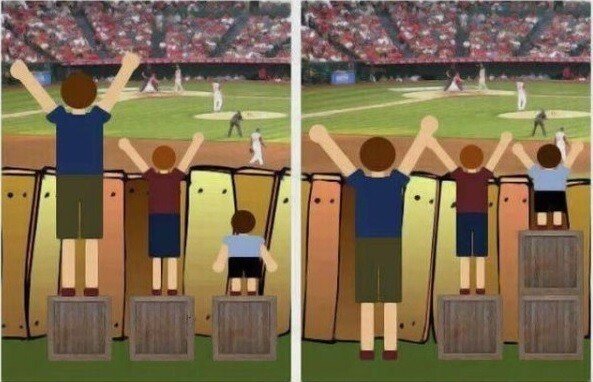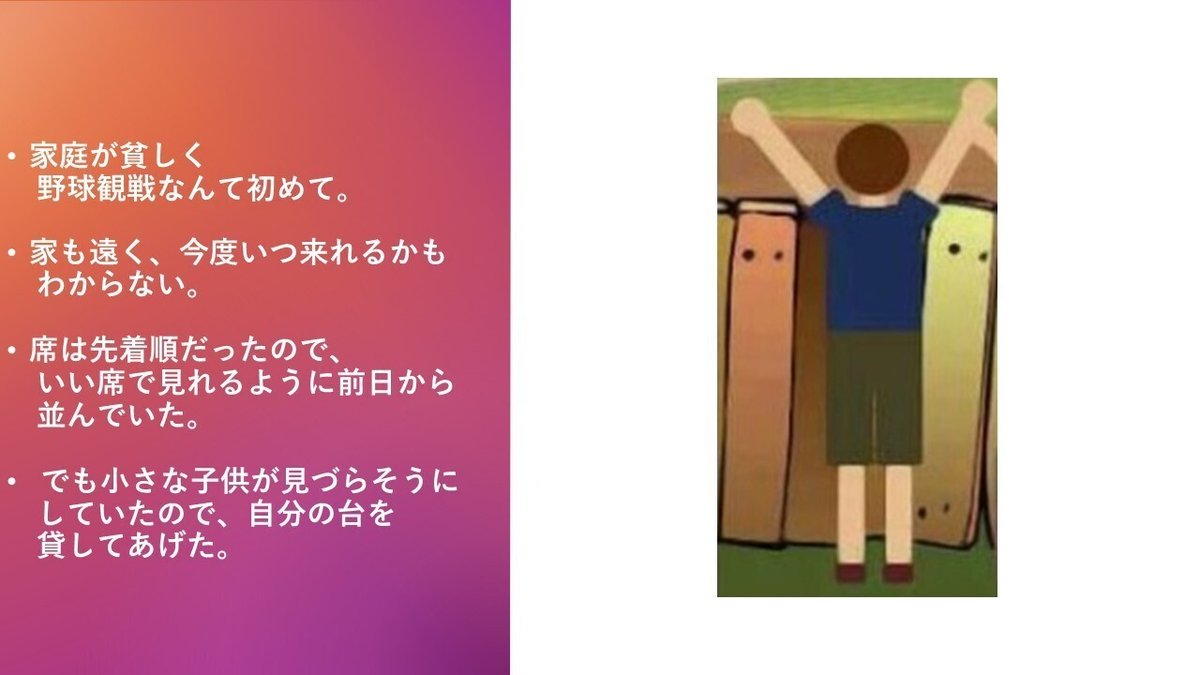
【読書の思考法】自己啓発は科学と年寄りが証明してくれる。
『学びとは、つまり人生の中で理解したと思っていたことを新しい形で突然、理解し直すことである。』
ドリス・レッシング(1919~2013)
まえがき
みなさんは読書をしますか?
ほぼ文字しか並ばないnoteなんて読んでいるくらいだから、きっとnoteユーザーは読書率も高いんじゃないかと思います。
読書の目的や好きなジャンルは人それぞれでしょう。
広義で言えばマンガや雑誌を読むことだって読書だし、世の中には辞書を通読する人もいるくらいです。
はたまた、何かインプットしなくてはと半ば強迫観念に駆られて読書している人もいるかもしれません。
味わい方は十人十色です。
そんな中から今回は自己啓発本についてです。
『読書によって直接的に学びを得たい人』向けのオススメ読書法をご紹介します。
学習における禁忌
自己啓発本に限らず、知識を得ようとする時にやってはいけないことが2つあります。
それは1つの情報源しか見ないことと、一次情報に触れないことです。
MAACoはこれまでに何度もアドラー心理学の話をしていますが、自己啓発の源流ともいうべき名著『嫌われる勇気』は、1冊で他の自己啓発本10冊分の価値があると思います。
それ程までに本質的でありながら具体にも富んでいて、人の心をリアルタイムに共感させ、読んだ者に確実に理解の階段をのぼらせる。
そんな素晴らしい一冊です。
しかし、ここまで散々褒め称えましたが断言します。
『嫌われる勇気を1冊しか読まない』くらいなら、『他の自己啓発本を10冊読む』ほうがいい。
この上ない手のひら返しをかましていますが、どちらも本当です。
少し掘ってみましょう。
①1つの情報源しか見ない
知識が定着しそれを行動に移せるようになる為には”気づき”が必要です。
ただ『知る』のではなく、『ハッとさせられる』ような心の内の気づき、『間違いない』と思えるような、言い換えれば”確信”です。
この”確信を得ること”が価値観にまで影響するほど深い知識の定着につながります。
逆に言うとここまで落とし込まないと、知っているだけでできない、知っているだけでやらない。
これでは行動力の伴わない意識高い系の出来上がりです。
さて、では人はどういったときに確信を得るのでしょうか?
それは、”あなたの持論において辻褄があった瞬間”です。
あなたの中に”これが正しいかもしれない”という一つの仮説があるとして、友人がそれを支持し、尊敬する師から類例を聞きかじり、そして実際にそれが科学的に証明されていることを知ったとき、あなたはその仮説に確信を持つでしょう。
知識があなたの価値観に根を張り、定着するのはこの瞬間なのです。
そしてこの例の中で仮説検証には友人、師、科学の3点を必要としています。
点と点がつながるなんて表現がされますが、点は最低でも2つないと線にはなれず3つないと面にはなれません。
どんなに正しくて価値がある書物でも、人は感情で意思決定する生き物なので、事実1点では価値観に定着せず変われないのです。
自己啓発を1つ知った程度では、知らないのと一緒です。
ひるがえせば、いくつかの情報源から”あなたなりの確信”を得ることは、価値観を変え行動まで変わる事を意味します。
②一次情報に触れない
もう1つのやってはいけないこと。
それは一次情報に触れないことです。
これは前提条件や文脈が抜け落ちたり、第三者の解釈が含まれてしまうからです。
おそらく理系の方は特にこの問題の大きさがわかるでしょう。
こうなるともはや知る意味も取り組む意味もありません。
意味がないどころかそれがマイナスになることすらありえます。
第三者の解釈というのは時に悪意や政治的な目的を持って発信されることもあるし、そこまでではなくともそもそも勘違いだったり、その人固有の前提条件を一般化して話している場合があるからです。
前提条件があなたにも当てはまるとはかぎらないし、何かしらのバイアスを押し付けられている可能性もあります。
1つ例をあげましょう。

このイラストは有名なので見たことがある方も多いと思います。
本来は平等と正義の比較に使われるものです。
ここで質問です。『どちらがあるべき姿だと思いますか?』
・・・
・・・・・・
・・・・・・・・・
・・・・・・・・・・・・
・・・・・・・・・・・・・・・
これはほとんどの方が右と回答します。
しかしもしこれに、こんな前提・背景があったらどうでしょう?


一気に心情が変わりませんでしたか?
これが解釈の怖さです。
この前提があったこととなかったことで、判断が180°変わってしまいます。
つまりその判断基準は『事実ではなくあなたの解釈』だったのです。
だからこそ、何者かの解釈を挟む二次情報ではなく一次情報にフォーカスしなくてはならないのです。
だから、この記事もそのまま信じてはいけません。
MAACoがどんなに客観的にお伝えしようとしても、固有の世界観による味付けがどこかに隠れているハズなのです。
さて、では一次情報とはどこにあるのか?
この問いはいささか哲学的だと思います。
自己啓発本自体も一次情報と考えられるでしょう。
前提条件が整理され、文脈の抜け落ちもない。
同一著者が一貫して書いているわけですからそれはそれで間違いありません。
ですが、知識は知識を土台とするものです。
究極的な事を言うと、本に載る一つ一つの単語の意味やその包含範囲に至るまで、出典を調べなくてはならなくなっていまいます。
それでは現実味がないので、理想的且つ現実的な一次情報という意味では、MAACoは科学誌だと思っています。
科学誌で理解を深める
これはどういうことか。
”自己啓発”を調べてみると
自己啓発(じこけいはつ)とは、自己を人間としてより高い段階へ上昇させようとする行為である。「より高い能力」、「より大きい成功」、「より充実した生き方」、「より優れた人格」などの獲得を目指す。
とのことでした。
詳細が気になる方はWikipediaをご覧いただくとして、自己啓発をそれ以下の単位まで分解していくと最終的に『心』と『思考』の話になってきます。
どのような思考のステップを踏んだら心、しいては行動に落とし込めるのか。
その時どんなバイアスが働いているのかなど。
こうなってくると心理学の分野です。
そして心理学ならば学問ですから、れっきとした科学であり、正確な一次情報にたどりつきやすくなります。
論文などが流石に読みづらければ、専門書でも結構です。
MAACo自身、その都度論文なんて読めません。
ちんぷんかんぷんです。より正確に掘ることができればいいのです。
方程式のように一般項となる定理や法則が存在するということは、解釈の介入のない事実を理解することができるということです。
心理学だけではありません。
感情や、行動の原理を、生物学の観点から遺伝子で説明する分野もあります。
科学によって”事実における理解の点”が複数つながったとき、例えそこに因果はなくても相関があり且つ統計的に有意であれば、あなたの理解はより確度をあげていくでしょう。
人生訓で答え合わせ
MAACoには年上は敬うべきという考えが微塵もありません。
こういうと危険な発言をするやばいやつというレッテルを貼られるのですがそうではなく、敬うかどうかの判断材料に年齢は関係ないと思うのです。
年上だろうが年下だろうが、条件なしで互いに敬意ははらおうと。
若くてもしっかりしたやつもいれば歳だけとった害悪もいるし、その逆もしかりです。
しかし、『幸せになる努力をやめなかったお年寄り』『問うことをやめなかったお年寄り』のエッセイ・人生訓は、どんなに全然違うタイプの人でも同じような答えに収束しています。
これは流石に若者ではなし得ません。
大局としては、同じ努力なら費やした時間がものをいうし、統計を取るにもその母数、すなわち人生の経験時間は多いほうが正確だからです。
そして彼らの”主張”、いえ、おそらくそんな強いものでもなく”感想”には、自己啓発のようなエッジはなく、成長意欲の強いビジネスマンにささりそうでは決してないものの、人生のまとめとして最期まで幸せに生きる覚悟に満ちているものがたくさんあります。
数多の自己啓発本や科学誌に書いてあったことが、究極に人間臭くなって伝わってくる。
しかも、一見ただのかわいいおじいちゃんやおばあちゃんから。
あとがき
MAACoは批判的思考:クリティカルシンキングがとても強いです。
だからこそ読書も、すべての社会の常識も、ルネ・デカルトの如く疑ってかかります。
Rethink MAACoというHNの由来も『Rethink:再考=考え直す』からきているくらいだから、『みんなこうだから』とか『普通こうだから』はMAACoの動く理由にはなりません。
しかし、立証された科学まで納得するまで疑っていては、たかが人一人の一生涯では時間もスキルも全く足りません。
本当にやるべきことを見極めて注力するためにも、客観的に証明された事実に関しては信じざるを得ません。。
こう考えたときに、今回の読書法は有益でした。
具体的な知識やスキルを身につけるだけでも何もしないよりもちろん良いですが、クリティカルシンキングの強いMAACoとしては腑に落ちていないものも多くありました。
科学で補完するにも関連分野は無数にあるし、闇雲に読書をしていては時間も食います。
そんなとき、普段あまり読まない人生訓をたまたま読んだのです。
曽野綾子さんの『人間の分際』でした。発刊当時83歳です。
それまで自己啓発や科学で証明された理論で世に広まってないものは、どちらかと言うと未来の理論だと思っていました。
これから広めていかなければいけないものだと。
しかし人間の分際では彼女の生きた経験として、数多の自己啓発と全く同じことが生々しく書かれている。
衝撃でした。
人間は何十年何百年もの間、全く成長していないのだとショックを受けました。
逆説的に、”真の知を蓄えたお年寄りは未来にも通用する生き方の模範解答”だという確信を持ったのはここでした。
”自己啓発”には胡散臭さを感じる方でも、”80年生きた感想と考察”ならスッと受け止められるんじゃないかと思える、人生のカンニング本。
人生訓・エッセイには時にそんな力があるようです。
Rethink MAACo
#思考法 #哲学 #読書 #科学 #お年寄り #年の功 #自己啓発 #学び #エッセイ #人生訓 #Rethink #MAACo
[The text below is an English translation generated by chatGPT.
I am not responsible for the accuracy of the information provided by this translation.]
"Learning means suddenly re-understanding something you thought you understood in a new way." - Doris Lessing (1919-2013)
Foreword
Do you enjoy reading? Considering you're reading this mostly text-based note, I'd guess that note users have a high rate of reading.
Everyone has different purposes and favorite genres when it comes to reading. Broadly speaking, reading manga or magazines counts as reading, and some people even read dictionaries cover to cover. Some might read out of a compulsion to intake new information. The ways to savor reading are diverse.
In this context, I'd like to focus on self-help books. I'll introduce a recommended reading method for those who want to gain direct insights from reading.
Prohibitions in Learning
Whether it's self-help books or any other source of knowledge, there are two things you should never do. One is relying on a single source of information, and the other is not accessing primary sources.
I've mentioned Adlerian psychology many times, and I believe the renowned book "Courage to be Disliked," which can be considered a foundational self-help book, is worth ten other self-help books.
It's profoundly essential and rich in specifics, engaging readers in real-time and ensuring they climb the ladder of understanding. It's a remarkable book. However, despite this praise, I must assert:
If you only read "Courage to be Disliked," you'd be better off reading ten other self-help books. This might seem contradictory, but both statements are true. Let's delve into this.
1. Relying on a Single Source of Information
To truly internalize knowledge and put it into action, you need "realization." It's not just about knowing but about having those moments of "aha" that lead to a deep-seated conviction.
This conviction roots knowledge deeply into your value system. Without it, you end up knowing without doing, leading to the state of the so-called "pretentious intellectual."
When do people gain conviction? It's when your personal theory aligns. Imagine you have a hypothesis you believe might be true. When a friend supports it, a respected mentor mentions a similar example, and you find it's scientifically proven, you gain conviction in your hypothesis.
This moment is when knowledge becomes part of your value system.
In this example, testing the hypothesis required three points: a friend, a mentor, and science. At least two points are needed to form a line, and three to form a plane.
No matter how valuable a single source is, humans make decisions emotionally, and one fact alone doesn't root it in our values. Knowing one self-help book is like not knowing it at all.
On the flip side, gaining "your own conviction" from multiple sources means your values and actions can change.
2. Not Accessing Primary Sources
The second prohibition is not accessing primary sources. Secondary information can miss context or include third-party interpretations.
Especially those with a scientific background will understand the significance of this issue. Misinterpreted or out-of-context information can be not just meaningless but even harmful.
Third-party interpretations might carry bias, misconceptions, or unique assumptions not applicable to you.
Let's take an example.
You might have seen the famous illustration comparing "equality" (left) and "equity" (right). Which do you think is the ideal?
...
...
...
Most would answer "right." But what if there was a background context like this?
...
Did your perspective change suddenly? This is the danger of interpretation. The basis of judgment wasn't the fact but your interpretation.
Therefore, you must focus on primary sources without third-party interpretations.
So, don't take this article at face value either. No matter how objectively I try to present it, my unique perspective is surely embedded somewhere.
Where are the primary sources? This is somewhat philosophical.
Self-help books themselves can be considered primary sources, as they're consistent in their author's perspective. However, knowledge builds upon other knowledge. Ideally, I consider scientific journals as primary sources.
Deepening Understanding Through Scientific Journals
When researching "self-help":
"Self-help refers to actions aimed at raising oneself to a higher level as a person. It seeks to achieve higher abilities, greater success, a more fulfilling life, or a superior personality."
Breaking down self-help, it primarily involves "mind" and "thought."
It's about embedding thought steps into the heart, understanding biases, etc. This falls into psychology, a scientific discipline where you can reach precise primary sources.
If research papers are too challenging, specialized books are fine. I don't always read research papers myself; it's often too complex. As long as you can dig accurately, it's enough.
Like mathematical equations, having fundamental principles or laws means understanding without interpretive intervention.
Psychology isn't the only relevant field. There are also biological perspectives explaining emotions and behaviors through genes.
When multiple "points of understanding" from science connect, your understanding will become more accurate, even without causation, if there's significant correlation.
Validating Through Life Wisdom
I, MAACo, don't believe in respecting elders solely due to age. Respect isn't determined by age but by mutual regard.
Regardless of age, we should show respect to everyone. There are competent young people and harmful older people, and vice versa.
However, essays and life wisdom from elders who never gave up on happiness or inquiry often converge on similar conclusions. Young people cannot achieve this. The same effort over more years brings more accurate insights, just like larger sample sizes in statistics.
Their "assertions," or perhaps "reflections," lack the sharpness of self-help books but are filled with determination to live happily until the end. These insights often echo what's written in numerous self-help books and scientific journals, conveyed in a deeply human way by seemingly ordinary elders.
Afterword
I have a strong sense of critical thinking. Hence, I doubt all societal norms and even established science until I'm convinced. The origin of my pen name "Rethink MAACo" comes from "Rethink: reconsider."
However, questioning established science endlessly isn't practical for one lifetime. To focus on what truly matters, you must trust objectively proven facts.
This reading method proved beneficial. While gaining specific knowledge and skills is better than doing nothing, many aspects didn't fully resonate with me as someone with strong critical thinking.
Reading life wisdom, like Ayako Sono's "Human Position" at 83, was impactful. Previously, I thought theories unproven and not widely accepted were future theories. However, her real-life experiences reflected the same truths as numerous self-help books.
I realized humanity hasn't evolved much over decades or centuries. Paradoxically, I became convinced that "elderly people with true wisdom are models for a future-proof way of life."
Even if self-help seems dubious, reflections from 80 years of living can be like a cheat sheet for life. Life wisdom and essays sometimes hold such power.
Rethink MAACo
いつか誰かのためになる。 そんな好循環を夢見て活動しています。 お力添えをよろしくお願いしますm(_ _)m
